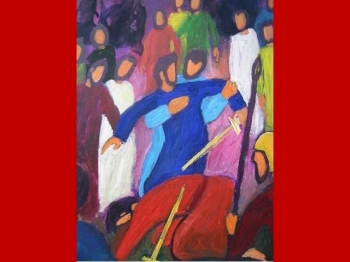On the subject of...

In the collective imagination, the sword is intrinsically bound to the figure of the medieval Knight, as are virtues such as loyalty, fidelity, solidarity, honour, nobility of soul, fortitude, self-denial, defence of the just and the true, and above all faith, hope and charity.
In addition to the sword, the rich symbolism in the Vigil of the Investiture of the Knights and Dames of the Holy Sepulchre of Jerusalem, also preserves the spurs, the urn of perfumed (new) oils, the blessing of the cloak, veil and insignia. The Rite of the Celebration clearly and succinctly illustrates this rich symbolism. The Gospel speaks specifically of the sword in reference to the life and teaching of Jesus.
°°°°°
Jesus was in the garden beyond the Kidron, a valley stream that divides the Old City of Jerusalem and the Mount of Olives. He had gone there after his last paschal supper, during which he had washed the feet of the disciples and pronounced the great prayer to the Father so that He would safeguard the disciples from the evil one and they in turn would be consecrated by the word of truth (see John 17). Judas, who was to betray the Master, knew the garden where Jesus used to rest and pray. He arrived with soldiers and guards to arrest the Lord. In the tumultuous words of the arrest "Then Simon Peter, who had a sword, drew it and struck the high priest’s servant, cutting off his right ear (...) Jesus commanded Peter, “Put your sword away! Shall I not drink the cup the Father has given me?” (John, 18: 10-11).
It is not the only place in which the Gospel speaks of swords, but it is the only one where it is not a metaphor, as for example is the case in Mt 10, 34: "Do not suppose that I have come to bring peace to the earth. I did not come to bring peace, but a sword”: an expression that should be read in the context of Jesus' so-called “missionary discourse” in which he illustrated the mission of the Twelve. Jesus himself had nullified all misunderstanding, when he spoke of the fight in the decisive hour of his own humiliation, recalling those who thought in terms of real weapons: " He said to them, “But now if you have a purse, take it, and also a bag; and if you don’t have a sword, sell your cloak and buy one (…) The disciples said, “See, Lord, here are two swords.” “That’s enough!” he replied. (Lk. 22, 36-38). The exegetes comment that Jesus, faced with that answer, reacted with a bitter and disconsolate: "Enough!" And that the choice for the Gospel comes at a high cost in terms of commitment in life "(G. Ravasi). Jesus would have been a "sign of contradiction" (Lk. 2, 34) and his word would have been “Sharper than any double-edged sword, it penetrates even to dividing soul and spirit," (Heb. 4, 12). The first to experience it would have been Mary, the mother of Jesus, according to Simeon's prophecy: "And a sword will pierce your own soul too" (Lk. 2, 35). Benedict XVI will comment that "the Mother with the sword in her heart is the prototype of this basic feeling - that is, of the compassion of God who suffers with men - of the Christian faith" (J. Ratzinger-Benedict XVI, Jesus of Nazareth: The Infancy Narratives, Ignatius Press, (2012).
Fernando Cardinal Filoni
Grand Master
(May 14, 2021)



